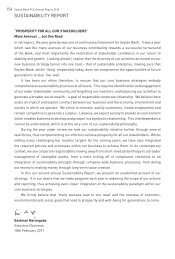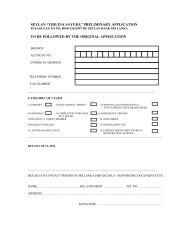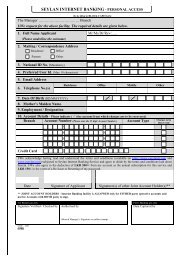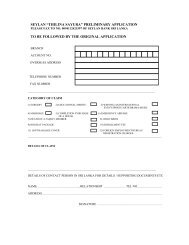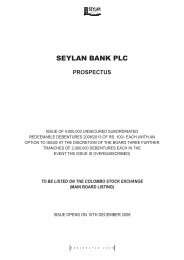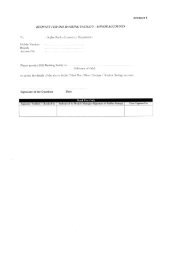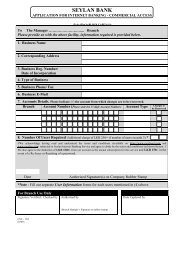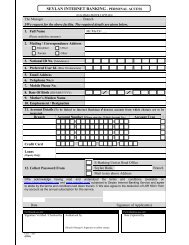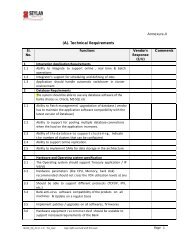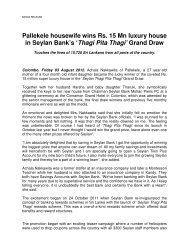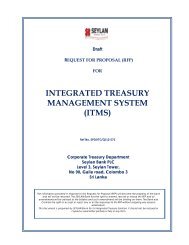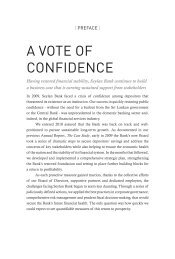The Case Study - Seylan Bank
The Case Study - Seylan Bank
The Case Study - Seylan Bank
You also want an ePaper? Increase the reach of your titles
YUMPU automatically turns print PDFs into web optimized ePapers that Google loves.
<strong>Seylan</strong> <strong>Bank</strong> PLC Annual Report 2009 151Notes to the Consolidated Financial Statements<strong>The</strong> <strong>Bank</strong> assesses whether objective evidence of impairment exists for financial assets that are significant(except for loans and advance explained in Note 1.4.6). For loans and advances, impairment loss is measuredindividually and collectively as explained in Note 19.When a loan is uncollectible, it is written off against the related provision. Such loans are written offafter all the necessary procedures have been completed and the amount of the loss has been determined.Subsequent recoveries of the amounts previously written off are included under ‘Other Income’ in theIncome Statement.If, in a subsequent period, the amount of the impairment loss decreases and the decrease can be relatedobjectively to an event occurring after the impairment was recognised, the previously recognised impairmentloss is reversed by adjusting the impairment provision account. <strong>The</strong> amount of the reversal is recognised inthe Income Statement.1.4.10.2 Non-Financial Assets<strong>The</strong> carrying values of Property, Plant & Equipment and investment properties are reviewed for impairmentannually or when events or changes in circumstances indicate that the carrying value may not be recoverable.If such indications exist and where the carrying values exceed the estimated recoverable amount, the assetsare written down to their recoverable amount. Impairment losses are recognised in the Income Statementunless it reverses a previous revaluation surplus for the same asset.Assets with an indefinite useful life, including goodwill, are not subject to amortisation and are tested onan annual basis for impairment and additionally whenever an indication of impairment exists. Assets thatare subject to amortisation are reviewed for impairment whenever events or changes in circumstancesindicate that the carrying amount may not be recoverable.<strong>The</strong> recoverable amount of an asset is the higher of its fair value less cost to sell or its value in use. Anydecrease in the carrying value is recognised as an expense in the Income Statement in the reporting periodin which the impairment loss occurs.For assets that do not generate largely independent cash inflows, the recoverable amount is determinedfor the cash generating unit to which that asset belongs. Management judgment is applied to establish cashgeneratingunits. Each of these cash-generating units is represented by an individual primary reportingsegment, or a sub-division of a primary segment.An impairment loss in respect of goodwill is not reversed. In respect of other assets impairment lossesrecognised in prior periods, are assessed at each Balance Sheet date for any indications that the loss hasdecreased or no longer exists. An impairment loss is reversed if there has been a change in estimates usedto determine the recoverable amount. An impairment loss is reversed only to the extent that the asset’scarrying amount does not exceed the carrying amount that would have been determined, net of depreciationor amortisation, if no impairment loss had been recognised.1.4.11 InventoryInventory mainly consists of stationery and gold. <strong>Bank</strong>’s policy for the accounting of inventory is as follows:Stationery: At weighted average cost method.Gold Stock: Market value at the year end.Liabilities and Provisions1.4.12 Deposits from CustomersDeposits include non-interest bearing deposits, saving deposits, term deposits, deposits redeemable atcall and certificates of deposit. <strong>The</strong>y are brought to account at the gross value of the outstanding balance.Interest paid is charged to the Income Statement.



